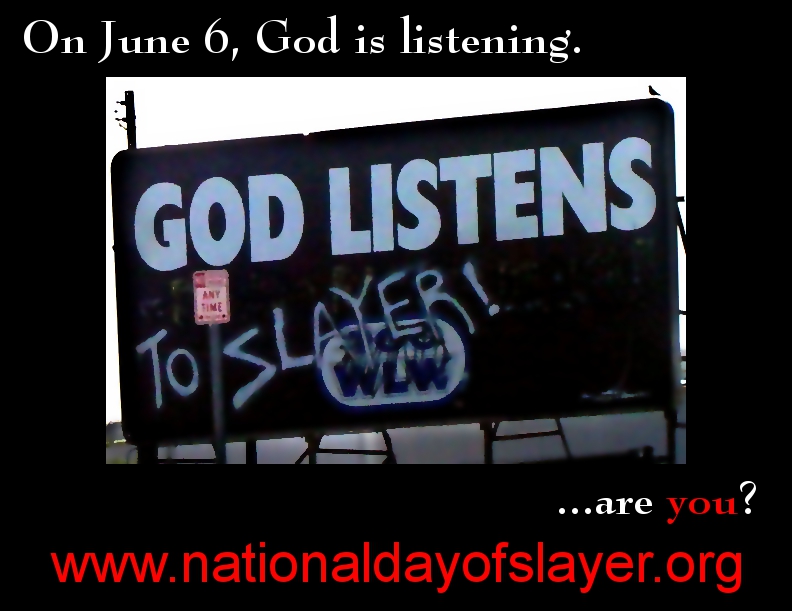

For those interested but not already familiar with the music I have been mentioning (or who are familiar but would like to see that I don't know what I'm talking about), here is something of an introduction to at least one of the styles I mentioned, Metal. I intend to relate something of the story and style of metal, its subgenres, and chief players [sic]. It is also intended for those people I know who ask me, "What do you like about this music?", as if I have to ask them, "What do you like about Green Day / Britney Spears / Eminem / someone else?" Aside from being explanatory, it's also a bit self-indulgent, and this being foremost a personal website, I think I have right to it, but beware: I editorialize. My comments here are based on research and personal listening habits, but if my introduction interests you, you should read around to check out other perspectives on the style. (Or even better, buy or borrow some classic metal albums and listen carefully.) I hope this forms an appropriate supplement to my page about death folk.
Metal is not especially popular right now. I've figured as much from observing what warrants attention on the radio, in the music press, and by people around me. When a mainstream critic bothers review a metal album, and actually likes it, tone is often surprise, as if metal musicians are assumed to crank out shoddy irrelevant tunes. Radio stations rarely ever play metal, except occasionally "Paranoid" or "Master of Puppets". The Rollings Stone's Definitive Album Guide doesn't even have an entry for Metallica. Music retailers regularly put Emperor and Slipknot together under "Death Metal," and some even drop Nirvana in the "heavy metal" category. I have heard Incubus referred to as "prog metal." My fellow students' interests center on hip-hop / R&B, pop-punk, and so-called "indie" music. Some will say they listen to "everything, except...", and with alarming regularity what follows is "country and heavy metal". When discussing music with others, most people turn out to know little about metal, but that hasn't stopped some from dismissing it repeating old stereotypes.
"Metal's just noise. Instead of being thoughtful or talented, they make money off singing about 'sex, drugs, and rock 'n' roll', and rebellious showing-off. It's for teenagers who want to scare mom and dad, and. They grow out of it, unless they simply don't grow up at all." Setting aside the fact that those objections are strikingly similar to my own notions of punk, none of them are accurate. Metal's aesthetics and thematic focus are fairly well-defined and often purposeful, instead of simply latching on to whatever your parents hate (that's often an accident). Sex, drugs, et. al. are fairly uncommon subjects (admittedly though, violence and religious issues are common). As a whole the level of musical talent and sophistication of metal musicians is higher than for any other rock style except prog, and tremendous respect is accorded to technical proficiency.
Aside from not knowing what metal is, usually people do not know who it is either, a problem usually related to the first one. As an experiment, I'm going to list a few bands, all of which are major names in their genre / subgenre. See how many you recognize:
Experience allows me to predict that the majority of bands people recognize will be in the last two groups, with the exception of Black Sabbath and Metallica. They almost never recognize anyone in the third group. These people are also sometimes surprised to hear that the last two groups are not considered metal. They usually think they are, but the majority of metalheads would beg to differ. Very roughly, the bands are A. Traditional metal, B. Speed metal, C. Extreme (black and death) metal, D. Hard rock, E. Nü "metal". These are not necessarily value judgments — Led Zeppelin is very good — but D. and E. bands generally are not of equal calibre, and in any case do not count as metal in the strict sense. (They do bear a relationship to it though, and if I need to I will refer to them collectively as "heavy rock music".) While not discounting some other factors, such as the fact that metal has already peaked and is in decline, or that the masses may just have bad taste, the situation just illustrated probably has a lot to do with the misunderstanding and maligning of metal: aside from general ignorance most people's impressions are based on unrepresentative and lower-quality bands.
Now that I've cleared that up, you may be wondering, "So what is metal?" Metal is a large but still largely cohesive musical genre. It has some core traits exhibited by most bands and styles, some of which are summarized below.
Right now this article is pretty incomplete. Until I can write more, here are some other metallinks to give you an idea:
These are the major styles of "real" metal, with their approximate chronological context and origins, as well as some examples of bands. All the bands, I think, are fairly well-known or somehow important, although I do not guarantee they are all very good. (Pantera in particular I think is the most overhyped metal band ever and not worth your money no matter how popular they are.) I'd recommend you investigate the bands beforehand; when I can, I'll get around to distinguishing the good and the bad. Some up-front recommendations: Black Sabbath, Iron Maiden, Metallica, Megadeth, Slayer (get their early albums).